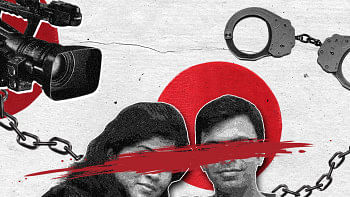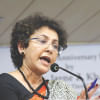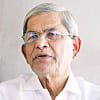Let journalists do their job

It is deeply disturbing to see how the rights of journalists to freely perform their duties, without fearing threats and violence, are repeatedly violated by departments of the state itself. For instance, in Lalmonirhat on Thursday, government employees confined five journalists to the office of an assistant commissioner (land) for about 40 minutes. The officials took this brutish measure because they did not want anyone to record videos of a hearing inside the premises. Earlier this month, a journalist was jailed in Sherpur through a mobile court for seeking information from the upazila nirbahi officer about the purchasing of computers and laptops. Thankfully, he was later freed and action was taken against the offending officer, but the fact remains that he was harassed for trying to hold state mechanisms to account.
And let's not forget that at least 18 journalists were assaulted or harassed while covering irregularities and violence during the January 7 general election, according to the Committee to Protect Journalists. There is arguably no other group of professionals that is persecuted for just doing their job.
Several questions emerge out of such events. Is this how government employees are instructed to act in these situations? Or are they so drunk on power that the state cannot control them? More importantly, why are these officials so insecure about providing information for public welfare? These questions, regardless of the answers, do not bode well for the country's journalists—or its democracy. They point to the administration's unwillingness to remain accountable to the people and put the government's celebrated narrative of free press and media under fire.
Indeed, if journalists truly enjoyed a safe and free environment, Bangladesh would not have slipped another notch in the World Press Freedom Index 2023. The country is now ranked 163rd out of 180 countries.
It's clear that this professed freedom—touted by state officials who point to the proliferation of media houses to back their arguments—is disconnected from reality. If such liberty existed, would journalists repeatedly face such attacks? Time and again, we have seen how laws are twisted to threaten journalists or take revenge. In the Sherpur incident, the Mobile Court Act was abused to put a journalist in jail, giving him no scope to defend himself. And at this point, the country is well aware of how the Digital Security Act, now rebranded as the Cyber Security Act, has become a weapon against the free press.
Indeed, if journalists truly enjoyed a safe and free environment, Bangladesh would not have slipped another notch in the World Press Freedom Index 2023. The country is now ranked 163rd out of 180 countries. The statistics, the countless incidents, the prevailing atmosphere of self-censorship—all point to the fact that journalism is slowly being killed in this country. And no rhetoric, however eloquent it may be, will be able to cover this reality. Therefore, the government must stop being in denial and work towards protecting this profession, for the sake of accountability and people's rights.


 For all latest news, follow The Daily Star's Google News channel.
For all latest news, follow The Daily Star's Google News channel. 









Comments